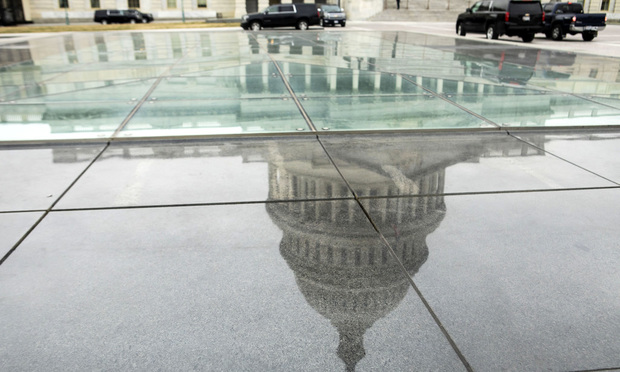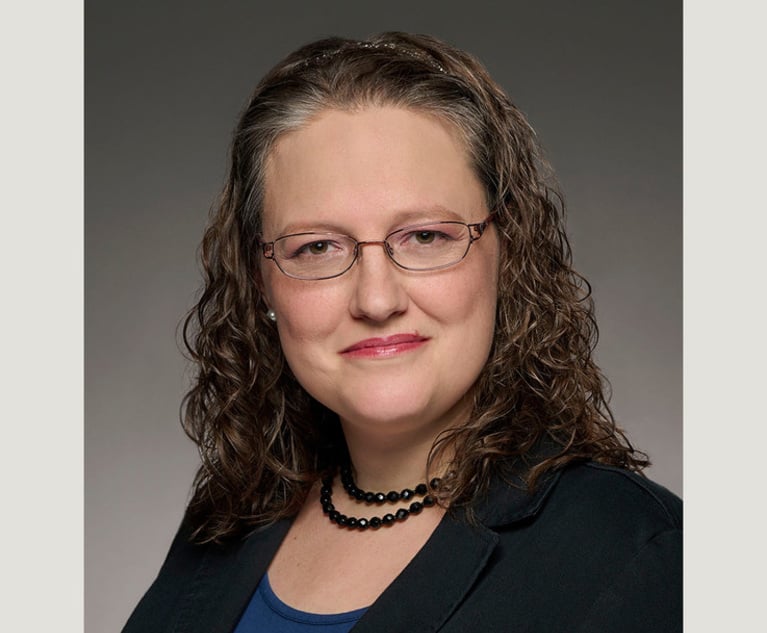Strine: 'Wild West Environment' of Political Spending Spurs More Companies to Disclose Campaign Contributions
A new study shows more publicly held companies are adopting stronger measures to disclose their spending on political campaigns.
October 25, 2019 at 03:37 PM
3 minute read
The original version of this story was published on Corporate Counsel
 The U.S. Capitol's Rotunda is reflected outside in Washington, D.C., on Feb. 27, 2019. Photo: Diego M. Radzinschi/ALM
The U.S. Capitol's Rotunda is reflected outside in Washington, D.C., on Feb. 27, 2019. Photo: Diego M. Radzinschi/ALM
A new study shows more publicly held companies are adopting stronger measures to disclose their spending on political campaigns.
The authors of the ninth annual CPA-Zicklin Index report attribute the trend to corporations not wanting to be burned in today's "incendiary political climate." The index is a joint project between the Center for Political Accountability in Washington, D.C., and the Zicklin Center for Business Ethics Research at the Wharton School of the University of Pennsylvania.
While the number of companies disclosing their political spending has been steadily rising, this year's figures show the largest ever year-to-year increase. Some 73 companies scored in the top tier for transparency, up from 57 last year, the report says.
In addition, the number disclosing some or all of their political spending with corporate funds increased to 316 this year from 294 last year as companies make disclosure part of their corporate governance practice.
Bruce Freed, president of the nonprofit, nonpartisan Center for Political Accountability, told Corporate Counsel that today's toxic political environment "kept coming up in conversations we had with companies on shareholder resolutions. They are concerned about contributions becoming controversial or getting caught up in political toxicity."
Such contributions can be especially damaging when they are made in secret but leaked to the public.
Freed said he saw a difference this time in the tenor of those annual conversations. "They are taking disclosure very seriously now. It's a sea change," he explained.
Freed said companies voiced concern about political fallout, including consumers shifting their spending to competitors and employees unhappy with candidates the company supports. Businesses are also worried about how third-party groups use their money to support unpopular issues.
In a foreword to the report, Chief Justice Leo Strine Jr. of the Delaware Supreme Court pinpoints the problem.
Strine, who has announced his retirement this fall, wrote, "Companies themselves face heightened risks from the Wild West environment that now surrounds political spending. Contributions that conflict with their core values and positions endanger their reputations, their relationship with consumers and employees and their bottom lines."
The research looked at companies listed in the S&P 500. It shows four companies scored 100% on the survey: Becton, Dickinson and Co.; Edwards Lifesciences Corp.; HP Inc. and Northrop Grumman Corp.
Some 229 companies scored in the top two tiers, an increase of 30% over 2015. In contrast, 59 companies scored zero in the survey.
In a statement, William Laufer, director of the Zicklin Center at Wharton, said, "The 2019 Index continues to chip away at unbridled corporate spending practices that now seem dated, risky, and out-of-touch. Competition over spending transparency and accountability incentivizes companies to adopt best practices, while encouraging firms to do good for the sake of goodness."
Read More:
Despite Pressures, Major Companies Continue to Disclose or Prohibit Political Spending
This content has been archived. It is available through our partners, LexisNexis® and Bloomberg Law.
To view this content, please continue to their sites.
Not a Lexis Subscriber?
Subscribe Now
Not a Bloomberg Law Subscriber?
Subscribe Now
NOT FOR REPRINT
© 2025 ALM Global, LLC, All Rights Reserved. Request academic re-use from www.copyright.com. All other uses, submit a request to [email protected]. For more information visit Asset & Logo Licensing.
You Might Like
View All

Here's What Corporate Litigators Expect Delaware Courts to Address in 2025
6 minute read
Tesla, Musk Appeal Chancery Compensation Case to Delaware Supreme Court
2 minute read
Fed Judiciary Panel Mulls Authority to Ban In-State Bar Admission Requirements
Trending Stories
- 1'It's Not Going to Be Pretty': PayPal, Capital One Face Novel Class Actions Over 'Poaching' Commissions Owed Influencers
- 211th Circuit Rejects Trump's Emergency Request as DOJ Prepares to Release Special Counsel's Final Report
- 3Supreme Court Takes Up Challenge to ACA Task Force
- 4'Tragedy of Unspeakable Proportions:' Could Edison, DWP, Face Lawsuits Over LA Wildfires?
- 5Meta Pulls Plug on DEI Programs
Who Got The Work
Michael G. Bongiorno, Andrew Scott Dulberg and Elizabeth E. Driscoll from Wilmer Cutler Pickering Hale and Dorr have stepped in to represent Symbotic Inc., an A.I.-enabled technology platform that focuses on increasing supply chain efficiency, and other defendants in a pending shareholder derivative lawsuit. The case, filed Oct. 2 in Massachusetts District Court by the Brown Law Firm on behalf of Stephen Austen, accuses certain officers and directors of misleading investors in regard to Symbotic's potential for margin growth by failing to disclose that the company was not equipped to timely deploy its systems or manage expenses through project delays. The case, assigned to U.S. District Judge Nathaniel M. Gorton, is 1:24-cv-12522, Austen v. Cohen et al.
Who Got The Work
Edmund Polubinski and Marie Killmond of Davis Polk & Wardwell have entered appearances for data platform software development company MongoDB and other defendants in a pending shareholder derivative lawsuit. The action, filed Oct. 7 in New York Southern District Court by the Brown Law Firm, accuses the company's directors and/or officers of falsely expressing confidence in the company’s restructuring of its sales incentive plan and downplaying the severity of decreases in its upfront commitments. The case is 1:24-cv-07594, Roy v. Ittycheria et al.
Who Got The Work
Amy O. Bruchs and Kurt F. Ellison of Michael Best & Friedrich have entered appearances for Epic Systems Corp. in a pending employment discrimination lawsuit. The suit was filed Sept. 7 in Wisconsin Western District Court by Levine Eisberner LLC and Siri & Glimstad on behalf of a project manager who claims that he was wrongfully terminated after applying for a religious exemption to the defendant's COVID-19 vaccine mandate. The case, assigned to U.S. Magistrate Judge Anita Marie Boor, is 3:24-cv-00630, Secker, Nathan v. Epic Systems Corporation.
Who Got The Work
David X. Sullivan, Thomas J. Finn and Gregory A. Hall from McCarter & English have entered appearances for Sunrun Installation Services in a pending civil rights lawsuit. The complaint was filed Sept. 4 in Connecticut District Court by attorney Robert M. Berke on behalf of former employee George Edward Steins, who was arrested and charged with employing an unregistered home improvement salesperson. The complaint alleges that had Sunrun informed the Connecticut Department of Consumer Protection that the plaintiff's employment had ended in 2017 and that he no longer held Sunrun's home improvement contractor license, he would not have been hit with charges, which were dismissed in May 2024. The case, assigned to U.S. District Judge Jeffrey A. Meyer, is 3:24-cv-01423, Steins v. Sunrun, Inc. et al.
Who Got The Work
Greenberg Traurig shareholder Joshua L. Raskin has entered an appearance for boohoo.com UK Ltd. in a pending patent infringement lawsuit. The suit, filed Sept. 3 in Texas Eastern District Court by Rozier Hardt McDonough on behalf of Alto Dynamics, asserts five patents related to an online shopping platform. The case, assigned to U.S. District Judge Rodney Gilstrap, is 2:24-cv-00719, Alto Dynamics, LLC v. boohoo.com UK Limited.
Featured Firms
Law Offices of Gary Martin Hays & Associates, P.C.
(470) 294-1674
Law Offices of Mark E. Salomone
(857) 444-6468
Smith & Hassler
(713) 739-1250






